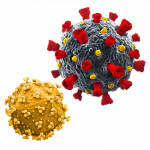Go to poz.com/tag/coronavirus for our continuing coverage of COVID-19.
The maker of HIV med Prezista (darunavir) warned against reports that the drug could be used to treat COVID-19, the disease caused by the novel coronavirus.
“Johnson & Johnson [J&J] has no evidence that darunavir has any effect against…the virus that causes COVID-19,” read a statement from the drug manufacturer. “Based on preliminary, unpublished results from a previously reported in vitro experiment, it is not likely [darunavir] will have significant activity against [the novel coronavirus] when administered at the approved safe and efficacious dose for the treatment of HIV-1 infection.”
The warning comes on the heels of a similar statement by pharma company AbbVie, whose HIV med Kaletra (lopinavir/ritonavir), AbbVie noted, had been touted via unconfirmed reports from China as an effective cure for COVID-19. AbbVie added that it “does not have access to Chinese clinical information and therefore cannot confirm [their] accuracy.”
In January, POZ cited Bloomberg reports that Kaletra was being used to treat the novel coronavirus (the link between the two goes back to the 2003 outbreak of SARS, when Kaletra lowered the death rate, according to aidsmap.com). According to AbbVie’s March statement, the original Bloomberg reporting was possibly erroneous or at least overplayed the role of HIV meds in treating COVID-19. For example, reporting that people with the new coronavirus who took Kaletra got better doesn’t necessarily mean that the HIV med caused the health improvement. After all, most people who contract coronavirus recover on their own.
AbbVie noted that it doesn’t expect any shortages of Kaletra, which is also marketed as Aluvia, for people who use it as HIV treatment.
In its statement, J&J not only advised doctors not to use Prezista to treat COVID-19 cases but also made the case that protease inhibitors—the class of HIV meds that includes Prezista—might not be effective against the novel coronavirus.
“HIV protease inhibitors are being considered as therapeutic options for COVID-19,” read the statement. “We believe this use is based on limited, unpublished virologic and clinical data in the treatment of patients infected with severe acute respiratory syndrome (SARS) coronavirus.”
J&J pointed out that when darunavir is prescribed as HIV treatment, it requires a booster med, such as ritonavir or cobicistat, and that darunavir without those supplemental agents could lead to higher rates of side effects.
But all is not grim news. J&J notes that many of its Janssen agents, including darunavir, are being tested against the novel coronavirus. (J&J owns Janssen Pharmaceutica).
In related news, keep in mind that novel coronavirus guidance and concerns for unique populations may vary. For example, see “3 Reasons COVID-19 Poses a Higher Risk for the LGBTQ Population,” “UPDATED: What People With HIV Need to Know About the New Coronavirus” and the similar article for people with cancer.







Comments
Comments